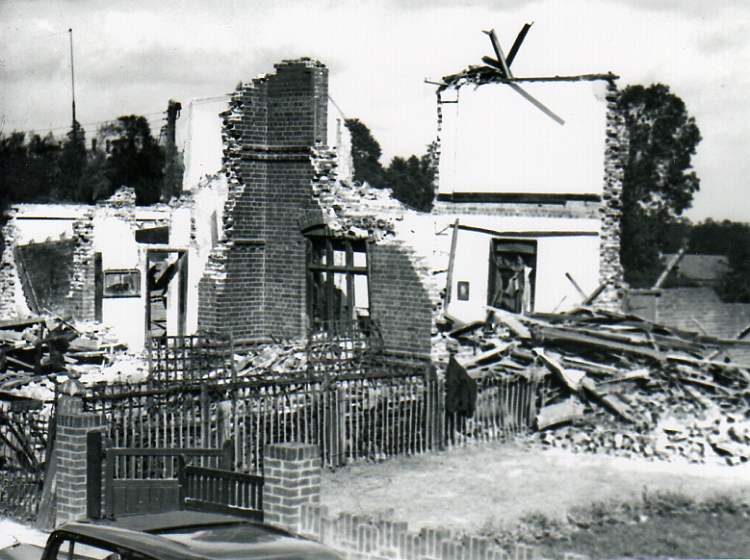- Screen Colours:
- Normal
- Black & Yellow

A Suffolk town in wartime" with John Bridges
Although he concentrated on events in the Suffolk town of Framlingham, the experiences of people living there during the War were replicated throughout Britain, making John's talk relevant to anyone who had memories of the Second World War. It was fortunate that some of the more elderly members in the audience did in fact recall personal events of the time.
He began his talk by giving examples of the evacuation of children from larger populated cities and towns during 1939. The Billleting Officer settled children in homes that had been selected as being most suitable for them. The homeowner received the sum of 10/6 per week for this service.
In May 1940 the threat of invading England had been spoken of by Hitler, prompting the government to issue leaflets such as 'If the Invader comes', and a second one in May 1941 with the title 'Beating the Invader'. This gave advice to the public concerning their well-being should an invasion occur. Winston Churchill, meantime, kept the Armed Forces alert to the likelihood of any invasion.
Invasion committees were formed in preparation for such an event. In Framlingham, Canon Lancaster was the head of the town's committee. Defence of the town consisted of concrete Pill Boxes, of which there were nine in Framlingham, including one in Well Close Square. Iron Hairpin Tank Traps were situated on the roads into Framlingham. Pipe Bombs (Canadian pipe mines filled with explosives) were placed beneath the surface of the roads into Framlingham and Saxmundham. Camouflaged steel Machine Gun Turrets, which could rotate, housing a gunner, were installed — one of these was situated in Infirmary Lane, Fore Street. As gas attacks were a concern, Gas Decontamination Centres were set up.
In addition to these defensive measures in towns inland, it was essential that extensive coastal defences were installed. These were organised by General Ironsides. The remains of some of these installations can still be seen along East Coast beaches. An influx of army servicemen added to the disturbance of everyday life in towns and villages, especially after 1943 when troops of American GI's arrived to liven up communities.
Government minister Anthony Eden urged the formation of Local Defence Volunteers, otherwise known as the 'Home Guard'. Among the duties performed by these groups of men, was the search for any German paratroopers. If any were found the church bells were to be rung. Major Collins was the Commanding Officer in charge of the Framlingham Home Guard.
By July 1940 the construction of school Air Raid Shelters throughout the country was complete. There was a large air raid in 1940 in Framlingham, which destroyed the Infant's School Head Teacher's house. The raid in 1940 on College Road killed one person. By June 1940, 117 Air Raid Shelters had been built in the town. The shelters included a large one, and a water reservoir was situated on Market Hill. Inside the Church, sand-bags surrounded the tomb of Henry Howard and others. In June 1942, around 700 Incendiary bombs fell in raids, during which three people were killed in Albert Road.
The town urgently required an Air Raid Siren. However, the request for one was turned down by the County Council, prompting Framlingham to pay for its own. This was fixed at the front of the Police Station, and was in use from 1942. Previous to the alert of the siren, people were made aware of an imminent air raid by the sound of a whistle blown by someone running from street to street. At this point in his talk, John blew a whistle.
When he spoke about the V1 rocket, known as a 'Doodlebug', a recorded sound effect was played — whilst an image of the Doodlebug was displayed on the screen. There was silence when the rocket's motor stopped and then the following sound of bomb blasts could be heard. John's talk concluded with the atmospheric, continuous wailing of a siren, signalling to the audience that it was safe for us to return home.
Diana Mann

John Bridges is President of the Framlingham & District Local History & Preservation Society. His interest in family history has enabled him to trace his origins in the town back to the 1720s when his five-time great grandfather Silvanus set up as a blacksmith in Double Street. John has written other books on Framlingham and also a history of the motor car in Suffolk. You can read about some of his discoveries here.

[photos: Framlingham Historical Photo Archive]